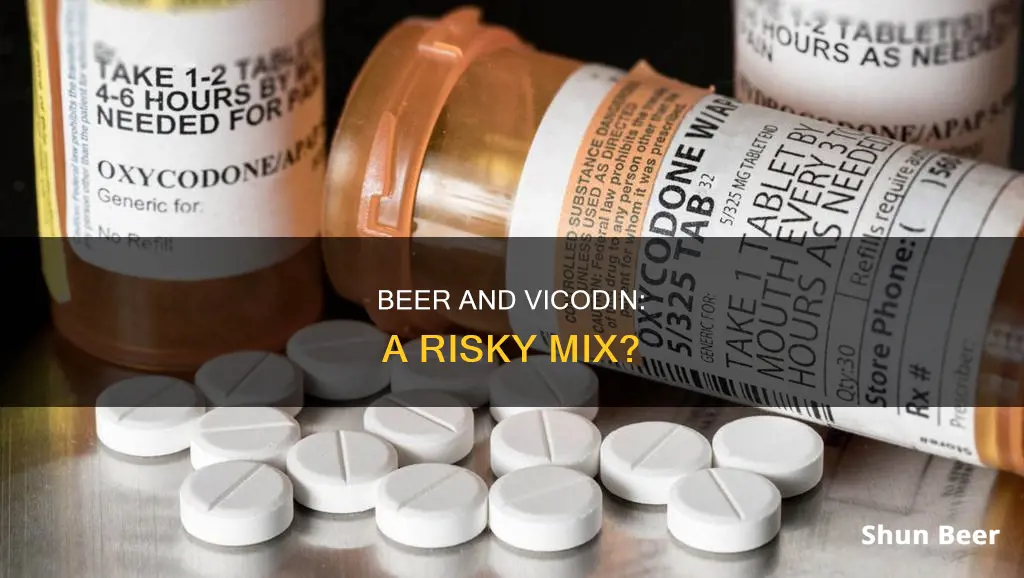
Vicodin is a prescription-strength painkiller that can be addictive. It is a combination of the opioid painkiller hydrocodone and the nonsteroidal anti-inflammatory drug acetaminophen. Alcohol is a depressant that has similar effects on the brain as Vicodin, and when mixed with the painkiller, it can amplify its effects, leading to serious health risks and even death. This combination can cause respiratory depression, slowed heart rate, nausea, vomiting, dehydration, and in extreme cases, liver failure, coma, and death. As a result, it is crucial to avoid consuming alcohol while taking Vicodin to prevent adverse health consequences.
What You'll Learn

The effects of mixing Vicodin and beer
Vicodin is a prescription-strength painkiller that contains a combination of hydrocodone, an opioid pain reliever, and acetaminophen, a non-opioid pain reliever. When taken as directed, Vicodin is highly effective for relieving pain. However, it is important to follow the prescription instructions and stop taking the medication when directed. For many people, discontinuing Vicodin is challenging, and they may develop an opioid addiction.
Mixing Vicodin and alcohol can have serious consequences. Alcohol is a depressant that slows down the central nervous system. When combined with Vicodin, which also slows down the body's systems, the effects of both substances are amplified. This can lead to respiratory depression, reduced blood pressure and heart rate, nausea, vomiting, and dehydration. The combination increases the feeling of intoxication and relaxation, enhancing the risk of addiction to either or both substances. Additionally, the risk of overdose and death is significantly elevated when alcohol and Vicodin are mixed.
The liver-damaging effects of acetaminophen, an ingredient in Vicodin, are also increased when combined with alcohol. Daily alcohol use, especially with acetaminophen, can damage the liver. Consuming excessive amounts of alcohol and acetaminophen has been linked to an increased risk of kidney damage as well.
In conclusion, mixing Vicodin and beer can have severe and potentially fatal consequences. It is crucial to avoid consuming alcohol while taking Vicodin to prevent adverse health effects and the risk of overdose and death. If you are struggling with Vicodin or alcohol addiction, seek professional help from a treatment facility or support group.
Beer Enemas: Do They Work or Are They Dangerous?
You may want to see also

The addictive nature of Vicodin
Vicodin is a prescription painkiller and a combination of hydrocodone, a synthetic opioid, and acetaminophen, the main ingredient in Tylenol. It is highly effective in relieving pain when taken as directed. However, it has a high risk of addiction, and its abuse can lead to severe health complications and even death.
The hydrocodone in Vicodin activates the same neurotransmitters as opiate drugs like heroin. This activation interferes with pain signals to the brain, changing one's perception of pain and emotional reaction to it. While short-term use is generally safe and effective, Vicodin's ability to induce a euphoric feeling makes it highly addictive. As a result, some people exceed the recommended dosage or use it for longer than prescribed, leading to tolerance and physical dependence.
Vicodin addiction can be challenging to identify, even in heavy users. Many individuals develop a chemical dependence resulting in withdrawal symptoms and a higher tolerance. This dependence often leads to addiction, marked by a compelling urge to continue using Vicodin despite negative consequences. The Diagnostic and Statistical Manual of Mental Disorders (DSM-V) outlines several symptoms associated with substance abuse disorders, and meeting specific criteria can help diagnose the severity of the disorder.
The negative health consequences of Vicodin abuse are extensive. In addition to the potential for addiction and liver damage, Vicodin abuse can cause digestive conditions, multiple forms of cancer, depressive disorders, heart attack, stroke, and fetal alcohol syndrome. Mixing Vicodin with alcohol further increases these risks, as both substances slow down the central nervous system, leading to potentially fatal respiratory depression.
Understanding Beer Columns: Brewing Process Simplified
You may want to see also

The dangers of mixing Vicodin and beer
Vicodin is a prescription-strength painkiller that contains a combination of hydrocodone, an opioid pain reliever, and acetaminophen, a non-opioid pain reliever. It is highly effective at treating moderate to severe pain. However, it also carries a high risk for addiction, especially if taken for longer than prescribed or in higher doses.
Beer, like all types of alcohol, is a central nervous system depressant. This means it slows down brain function, affecting coordination, muscle control, and energy levels.
Mixing Vicodin and beer can have serious, and even fatal, consequences. Here are some of the dangers of combining these two substances:
Enhanced Effects of Vicodin
Beer can enhance the effects of Vicodin, including its muscle relaxant effects. This can lead to slowed breathing and a decreased heart rate, which may be fatal. The combination may also cause nausea and vomiting, which can result in dehydration and further harmful side effects.
Increased Risk of Addiction
Both Vicodin and beer act on the brain's reward centre, releasing dopamine and creating feelings of pleasure and euphoria. When combined, they can increase the risk of becoming addicted to either or both substances. This can lead to compulsive abuse and an increased risk of overdose.
Liver Damage
Acetaminophen, one of the components of Vicodin, can cause liver damage, especially when consumed in large amounts. Beer also has the potential to damage the liver, even in moderate amounts. Combining the two can significantly increase the risk of acute liver failure.
Kidney Damage
The combination of Vicodin and beer can also lead to kidney damage.
Other Health Risks
Mixing Vicodin and beer can result in a range of other adverse health effects, including permanent nerve damage, brain damage, coma, and even death. Beer may also interact with other components of Vicodin, such as hydrocodone, further increasing the risk of serious side effects.
In conclusion, mixing Vicodin and beer can be extremely dangerous and can lead to severe, potentially fatal, health consequences. It is important to avoid consuming alcohol while taking Vicodin to minimise the risk of adverse effects and to follow the prescription instructions carefully to reduce the risk of addiction and overdose.
Miller Beer Text Rebates: How Do They Work?
You may want to see also

The side effects of mixing Vicodin and beer
Mixing Vicodin and beer can have serious side effects, including fatal ones. Both substances are central nervous system (CNS) depressants, which means they slow down the central nervous system. When combined, their effects are amplified, and they can induce respiratory depression, brain damage, coma, and even death.
Vicodin is a prescription-strength painkiller that contains hydrocodone and acetaminophen. Hydrocodone is an opioid that alters the way pain signals interact with the brain. Acetaminophen is a pain and fever reducer that is available over the counter. However, even though acetaminophen is available without a prescription, it should not be mixed with alcohol. Taking the recommended dosage of acetaminophen with moderate amounts of alcohol can increase the risk of kidney disease.
When Vicodin and beer are mixed, the combination can further slow down the central nervous system, leading to dangerous levels of respiratory depression. This means that the respiration rate can fall to levels where the brain fails to send signals to the body to breathe, resulting in death. The combination can also cause other respiratory issues such as shortness of breath, chest pain, or a stuffy nose.
In addition to respiratory problems, mixing Vicodin and beer can lead to extreme sedation, confusion, and sleepiness. Prolonged use of this combination can cause severe liver damage, as both alcohol and Vicodin are processed in the liver. Continued use can also result in recurring stress to the lungs and long-term damage.
Some of the other short-term side effects of mixing Vicodin and beer include trouble remembering things, difficulty concentrating, uncontrolled eye movements, loss of consciousness, and permanent nerve damage.
Beer and Vicodin: Risky Mix?
You may want to see also

Treatment for addiction to Vicodin and beer
Mixing Vicodin and alcohol can have serious health consequences, including liver damage and failure, respiratory depression, nausea, vomiting, dehydration, and even death. Therefore, it is important to seek professional help if you or someone you know is struggling with addiction to Vicodin and beer.
Treatment for Vicodin and beer addiction typically begins with detoxification, which involves medical supervision in a hospital setting to manage withdrawal symptoms such as nausea and vomiting. This process usually lasts about seven days.
After detoxification, inpatient rehabilitation treatment is often recommended. This involves residing at a rehabilitation center and participating in individual and group therapy sessions, as well as 12-step programs, to learn how to live without Vicodin and alcohol. The duration of inpatient rehabilitation can vary from 30 days to one year, depending on the severity of the addiction.
Outpatient treatment is also an option after completing inpatient rehabilitation. This allows individuals to live at home while receiving therapy and other treatments at a treatment center. Outpatient treatment helps individuals stay committed to their new sober lifestyle and reduces the risk of relapsing into Vicodin and alcohol use.
In addition to professional treatment, there are helplines and support groups available, such as SAMHSA's National Helpline, that can provide information, referrals, and support for individuals and families facing substance use disorders. These services are confidential and free of charge.
It is important to note that treatment plans may vary depending on individual needs and the severity of the addiction. Seeking professional help is crucial to ensure a safe and effective recovery process.
Beano and Beer: Does the Enzyme Work?
You may want to see also
Frequently asked questions
No, it is not safe to mix beer with Vicodin. Both substances are central nervous system (CNS) depressants, and mixing them can amplify their effects, possibly leading to respiratory depression, brain damage, coma, and even death.
Mixing beer with Vicodin can lead to a range of serious side effects, including respiratory depression, reduced blood pressure and heart rate, nausea, vomiting, loss of consciousness, permanent nerve damage, acute liver failure, and kidney damage.
Beer and Vicodin are both central nervous system depressants, which means they slow down brain function and have sedative effects on the body. When combined, these effects are amplified, increasing the risk of severe side effects and overdose.
There are several signs that may indicate addiction to Vicodin and alcohol, including the inability to stop drinking while on Vicodin, drinking before social gatherings, going out of your way to avoid situations where you don't have access to Vicodin, and mood changes when someone takes away your access to Vicodin.
If you think you may have an addiction to Vicodin and alcohol, it is important to reach out for professional help. Treatment facilities, such as rehabilitation centers, can provide you with the support and resources needed to overcome your addiction.







